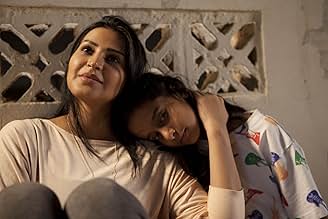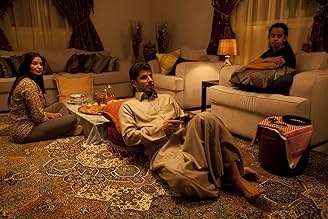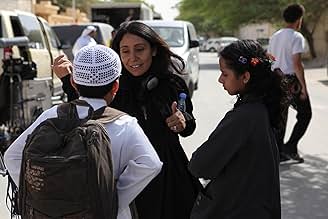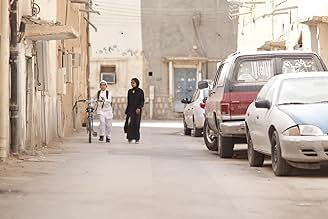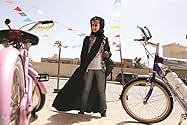Wadjda
- 2012
- Tous publics
- 1h 38m
IMDb RATING
7.5/10
22K
YOUR RATING
An enterprising Saudi girl signs on for her school's Koran recitation competition as a way to raise the remaining funds she needs in order to buy the green bicycle that has captured her inte... Read allAn enterprising Saudi girl signs on for her school's Koran recitation competition as a way to raise the remaining funds she needs in order to buy the green bicycle that has captured her interest.An enterprising Saudi girl signs on for her school's Koran recitation competition as a way to raise the remaining funds she needs in order to buy the green bicycle that has captured her interest.
- Director
- Writer
- Stars
- Nominated for 1 BAFTA Award
- 22 wins & 36 nominations total
Abdullrahman Al Gohani
- Abdullah
- (as Abdullrahman Algohani)
Sara Al Jaber
- Leila
- (as Sara Aljaber)
- Director
- Writer
- All cast & crew
- Production, box office & more at IMDbPro
Featured reviews
The total lack of films that come out of Saudi Arabia made Wadjda, a Saudi film by Haiffa Al- Mansour, instantly alluring. Haiffa Al-Mansour is already accredited as being the first successful woman filmmaker in Saudi Arabia's history.
This is very much Al- Mansour's film. She charms the viewer with the common everyday struggles of the Saudi woman, and rather than address the issues in a combative way, her approach is warm, even cute. This draws us in to her characters and provides us with some heartfelt laughs along the way.
The precocious 10-year Wadjda is growing up in Riyadh where she wants nothing more than a shiny new bicycle, but not only is she a little short on riyals, in Saudi Arabia women do not to ride bicycles. Saudi moral code bans woman from driving, going out in public unveiled, living unaccompanied, leaving the country alone, and opposing their husbands' orders in any way.
Small details make grand impressions: In an all girls school teenage students paint their toenails, a sin, and are publicly vilified for it. The mere possibly that workmen half a mile away might see school girls playing in their courtyard forces all the girls to rush inside, lest they be judged impure. Pubescent girls are considered impure and must use a tissue just flip the pages of Koran.
Wadjad's truly beautiful mother spends much of her time perfecting her appearance only then to have to then cover herself with a full hijab. She is never openly defiant; defiance is impossible, but even thought she is obeying age old traditions that we'd assume would have dulled any emotional protest, through the mother's submission we get a brief glimpse of her distress, the natural human emotional distress that no amount of "aged tradition" or religious subjugation has the right to inflict on any human being.
In a country where cinemas are banned, Riyadh is not exactly a city where women can just go around shooting films. Females mixing with male co-workers would bring dire consequences. Al-Mansour shot the film anyway, directing much of it from the back of a van, and the result is a film representing the triumph of the defiant feminine spirit, in all forms.
For more film reviews visit getthebonesaw.blogspot.com
This is very much Al- Mansour's film. She charms the viewer with the common everyday struggles of the Saudi woman, and rather than address the issues in a combative way, her approach is warm, even cute. This draws us in to her characters and provides us with some heartfelt laughs along the way.
The precocious 10-year Wadjda is growing up in Riyadh where she wants nothing more than a shiny new bicycle, but not only is she a little short on riyals, in Saudi Arabia women do not to ride bicycles. Saudi moral code bans woman from driving, going out in public unveiled, living unaccompanied, leaving the country alone, and opposing their husbands' orders in any way.
Small details make grand impressions: In an all girls school teenage students paint their toenails, a sin, and are publicly vilified for it. The mere possibly that workmen half a mile away might see school girls playing in their courtyard forces all the girls to rush inside, lest they be judged impure. Pubescent girls are considered impure and must use a tissue just flip the pages of Koran.
Wadjad's truly beautiful mother spends much of her time perfecting her appearance only then to have to then cover herself with a full hijab. She is never openly defiant; defiance is impossible, but even thought she is obeying age old traditions that we'd assume would have dulled any emotional protest, through the mother's submission we get a brief glimpse of her distress, the natural human emotional distress that no amount of "aged tradition" or religious subjugation has the right to inflict on any human being.
In a country where cinemas are banned, Riyadh is not exactly a city where women can just go around shooting films. Females mixing with male co-workers would bring dire consequences. Al-Mansour shot the film anyway, directing much of it from the back of a van, and the result is a film representing the triumph of the defiant feminine spirit, in all forms.
For more film reviews visit getthebonesaw.blogspot.com
¨You won't be able to have children if you ride a bike.¨
Wadjda is a beautiful yet simple film about a young girl who is willing to break society's boundaries and traditions in order to achieve her goal. In a sense it plays out as a metaphor considering Wadjda is the first feature film from Saudi Arabia which happens to be directed by a female. In a culture where women aren't allowed to speak up to men or even to drive a vehicle, Haifaa Al-Mansour has found a way to share her voice with the world through cinema. That is groundbreaking on its own considering that Saudi Arabia doesn't even have a film industry and that women are very much tied up to the limitations that their society puts on them. Al- Mansour, who also wrote the screenplay, gets her message across in a simple manner without trying to be judgmental or harsh on her culture. It is through the eyes of this 10 year old girl that we see how difficult the culture is on women. Not being allowed to ride a bike for fear that she could lose her virtue and purity plays out as a metaphor as to the limitations females face in these countries. I'm pretty sure that we all agree with Al-Mansour's viewpoints here in the west, but it is a shame that this film won't be seen by the people who really should see this film, the Saudis. It may be a familiar tale to us (it has all the known elements of a classic underdog story), but it works thanks to a wonderful performance from the young Waad Mohammed who plays a character we all can identify and relate to. Wadjda is worth seeing for the historical significance it has for females in Islamic countries who are trying to get their voice heard.
Wadjda (Waad Mohammed) is a ten year old girl from Saudi Arabia who lives with her mother (Reem Abdullah) in Riyadh. She's from a very conservative society where women have to cover their hair around men, but she is a very lovable girl who's always pushing the boundaries to her limitations. When one of the boys (Abdullrahman Al Gohani) begins teasing her and outruns her on his bike, she promises that she will buy one to race him and beat him. She sees a beautiful green bike on sale and since her mother doesn't give her the money because she considers girls shouldn't ride bikes, Wadjda decides to raise the money herself. The perfect opportunity presents itself when director Ms. Hussa (Ahd) offers prize money for the winner of a Koran recitation competition at her school. Wadjda begins to dedicate her time and efforts to this competition, while her mother is worried about trying to convince her husband (Sultan Al Assaf) to stay with her and not get remarried. Wadjda is dedicated to achieving her goal despite the limitations presented by the people around her.
The young and talented Waad Mohammed stands out in this film with a heartfelt and lovable performance. It is a simple tale and one we've seen many times in the past with the exception that this film is told by someone who has been facing those very same limitations. Some universal themes about the human spirit and the power of the will are portrayed nicely in this film through the eyes and smile of Waad Mohammaed. Director, Al-Mansour, also gives us glimpses of the limitations women have to face through very small scenes and moments. There is a scene where Wadjda's mother is shopping for a dress and she tries on a beautiful red one and you can't help but wonder what a waste it is considering she can only wear it at home for her husband. She covers herself completely when there is a man around. She also spends so much time fixing her hair, only to cover it until her husband who sometimes doesn't show up in days can appreciate it. Al-Mansour presents these scenes without being judgmental, but they come through very well. Wadjda, like us, doesn't seem to understand all this and won't conform to those boundaries, which is the director's way of sharing her hope for a brighter future for these women. Maybe if there were more determined girls like Wadjda they could break through some of those boundaries and limitations and have some more freedom. The film is full of hope like the main character and it is one worth seeing.
Wadjda is a beautiful yet simple film about a young girl who is willing to break society's boundaries and traditions in order to achieve her goal. In a sense it plays out as a metaphor considering Wadjda is the first feature film from Saudi Arabia which happens to be directed by a female. In a culture where women aren't allowed to speak up to men or even to drive a vehicle, Haifaa Al-Mansour has found a way to share her voice with the world through cinema. That is groundbreaking on its own considering that Saudi Arabia doesn't even have a film industry and that women are very much tied up to the limitations that their society puts on them. Al- Mansour, who also wrote the screenplay, gets her message across in a simple manner without trying to be judgmental or harsh on her culture. It is through the eyes of this 10 year old girl that we see how difficult the culture is on women. Not being allowed to ride a bike for fear that she could lose her virtue and purity plays out as a metaphor as to the limitations females face in these countries. I'm pretty sure that we all agree with Al-Mansour's viewpoints here in the west, but it is a shame that this film won't be seen by the people who really should see this film, the Saudis. It may be a familiar tale to us (it has all the known elements of a classic underdog story), but it works thanks to a wonderful performance from the young Waad Mohammed who plays a character we all can identify and relate to. Wadjda is worth seeing for the historical significance it has for females in Islamic countries who are trying to get their voice heard.
Wadjda (Waad Mohammed) is a ten year old girl from Saudi Arabia who lives with her mother (Reem Abdullah) in Riyadh. She's from a very conservative society where women have to cover their hair around men, but she is a very lovable girl who's always pushing the boundaries to her limitations. When one of the boys (Abdullrahman Al Gohani) begins teasing her and outruns her on his bike, she promises that she will buy one to race him and beat him. She sees a beautiful green bike on sale and since her mother doesn't give her the money because she considers girls shouldn't ride bikes, Wadjda decides to raise the money herself. The perfect opportunity presents itself when director Ms. Hussa (Ahd) offers prize money for the winner of a Koran recitation competition at her school. Wadjda begins to dedicate her time and efforts to this competition, while her mother is worried about trying to convince her husband (Sultan Al Assaf) to stay with her and not get remarried. Wadjda is dedicated to achieving her goal despite the limitations presented by the people around her.
The young and talented Waad Mohammed stands out in this film with a heartfelt and lovable performance. It is a simple tale and one we've seen many times in the past with the exception that this film is told by someone who has been facing those very same limitations. Some universal themes about the human spirit and the power of the will are portrayed nicely in this film through the eyes and smile of Waad Mohammaed. Director, Al-Mansour, also gives us glimpses of the limitations women have to face through very small scenes and moments. There is a scene where Wadjda's mother is shopping for a dress and she tries on a beautiful red one and you can't help but wonder what a waste it is considering she can only wear it at home for her husband. She covers herself completely when there is a man around. She also spends so much time fixing her hair, only to cover it until her husband who sometimes doesn't show up in days can appreciate it. Al-Mansour presents these scenes without being judgmental, but they come through very well. Wadjda, like us, doesn't seem to understand all this and won't conform to those boundaries, which is the director's way of sharing her hope for a brighter future for these women. Maybe if there were more determined girls like Wadjda they could break through some of those boundaries and limitations and have some more freedom. The film is full of hope like the main character and it is one worth seeing.
In a land where where cinemas are illegal, the first feature film shot entirely in Saudi Arabia by its first female director, 'Wadjda' is simple yet alluring neorealist film about a child and a bicycle. Haifaa Al-Mansour's brave effort gives us an interesting glimpse into the lives of women in a strict religious country like Saudi Arabia.
Being scolded for not wearing a head-scarf to school and for singing when her father's friends are in the other room (women unable to show themselves or their talents in presence of men), being sexually harassed by a building site worker, seeing her mother sad and angry because her dad is about to marry another woman (desperation for a male heir and the existence of polygamy), her mother almost losing her job because of her dependence on a rude driver (women are not allowed to drive any kind of transport), seeing one of her classmates getting married (rare but existent child marriages), seeing two elder schoolmates get wrongfully accused of immoral intimate conduct, and feeling disappointed after not seeing her name in the family tree (only male children are given importance); these are just few of the female struggles we see through the eyes of our young tomboy heroine, Wadjda. From the very first scene where she stands out in a group of singing school girls with her converse shoes, we see Wadjda as someone rebellious and strong. In a repressive land where women are oppressed, based on strict religious laws, not only by men but by other women as well, Wadjda dreams of having a green bicycle, so that she could overtake her annoying yet caring friend Abdullah. Though girls are not allowed to ride bikes, she starts collecting money by selling love-song mixed tapes and football club bracelets to her schoolmates. And thus begins her journey. Just like 'The Bicycle Thief', the bicycle here signifies freedom.
The young yet incredibly talented Waad Mohammed gives a charming performance, and carries the movie on her shoulders with terrific ease. Waad along with Haifaa (Director) are the two brave talents that emerge from this feature. All the supporting actors act commendably as well. International composer Max Richter's background score is subtle yet as captivating as the movie itself. Shot with such authentic beauty, there are many scenes which stay in your mind long after the movie is over, one of which is where the young friend Abdullah asks Wadjda, in an adorably sweet way, if she knows that he wants to marry her when they grow up; the scene has a lot of meaning and hope attached to it.
It's not just a critique on Saudi society, but it's a universal story which talks about a society's limitations and possibilities.
Being scolded for not wearing a head-scarf to school and for singing when her father's friends are in the other room (women unable to show themselves or their talents in presence of men), being sexually harassed by a building site worker, seeing her mother sad and angry because her dad is about to marry another woman (desperation for a male heir and the existence of polygamy), her mother almost losing her job because of her dependence on a rude driver (women are not allowed to drive any kind of transport), seeing one of her classmates getting married (rare but existent child marriages), seeing two elder schoolmates get wrongfully accused of immoral intimate conduct, and feeling disappointed after not seeing her name in the family tree (only male children are given importance); these are just few of the female struggles we see through the eyes of our young tomboy heroine, Wadjda. From the very first scene where she stands out in a group of singing school girls with her converse shoes, we see Wadjda as someone rebellious and strong. In a repressive land where women are oppressed, based on strict religious laws, not only by men but by other women as well, Wadjda dreams of having a green bicycle, so that she could overtake her annoying yet caring friend Abdullah. Though girls are not allowed to ride bikes, she starts collecting money by selling love-song mixed tapes and football club bracelets to her schoolmates. And thus begins her journey. Just like 'The Bicycle Thief', the bicycle here signifies freedom.
The young yet incredibly talented Waad Mohammed gives a charming performance, and carries the movie on her shoulders with terrific ease. Waad along with Haifaa (Director) are the two brave talents that emerge from this feature. All the supporting actors act commendably as well. International composer Max Richter's background score is subtle yet as captivating as the movie itself. Shot with such authentic beauty, there are many scenes which stay in your mind long after the movie is over, one of which is where the young friend Abdullah asks Wadjda, in an adorably sweet way, if she knows that he wants to marry her when they grow up; the scene has a lot of meaning and hope attached to it.
It's not just a critique on Saudi society, but it's a universal story which talks about a society's limitations and possibilities.
It is quite hard to come to Wadjda with a clear head and I suspect with the awards season coming up, it will be harder to do so in the future, which is why I wanted to watch it now. Part of the reason for this is that the film has had quite a bit of publicity due to its place in history, it being the first film in Saudi Arabia directed by a woman and this made me think that perhaps critics would have been quick to be generous to it. For sure I think this is a factor and the context of it representing (in theory) a country moving towards ever so slightly less hard-line conservatism may also be a factor in awards voting; but my concern was that this mean weaknesses were forgiven and stronger aspects were hyped up. The second thing in my mind was that perhaps Wadja would be very critical of Saudi as it may be seen as "time to settle some scores" and that this would be less a film and more a finger wagging exercise.
The reality is that neither of these are really the case and indeed the main strength of Wadjda is that it is simply a coming-of-age story which is set in Saudi Arabia. This means that the film doesn't push an agenda in a very heavy handed and frequent way, but rather just uses the culture of its setting as part of its story, just like any other such film would do in the context of their country. I liked this a lot because very quickly I was able to settle in and just enjoy the film for its character and story. And it helps that the story is engaging, warm and quite cheering in some ways; Wadjda is a sweet heart to the film and is very well played indeed by Waad Mohammed and she plays very well with her simple goal of just wanting to be herself and not be restricted by others – again a theme that maybe has more significant in her context, but still one common to these types of films. The film plays his out well with other threads and challenges to others around her which resonate with the impact of restrictions but again not in a heavy-handed or really obvious way.
It is a fine line to walk but the film does manage to flag issues for discussion but not to do so in a way that is overly critical or unrealistic even if it is progressive; perhaps to use the right language it is a very subdued and modest criticism and it is never front and centre on the screen. The balance means that it will engage you with the simple structure of its story while also making its points with things shown to inform and characters within the story used to illustrate different aspects of choices to be made – whether it be Wadjda's refusal to be restrained or Ms Hussa's overcompensation for not doing the same herself. It is very well shot and directed – and not "considering the circumstances", but rather it just is. The use of locations is really good, giving the film a strong sense of play and I do hope someday there is a "making of" documentary as I think the daily reality of making this must itself be an interesting story.
Wadjda is a very good film even if I think a lot of the hype and gushing that will come during the awards season is as much about the context as it is about the film itself – although this is not a bad thing by any means. The makers walk a fine line really well – not making direct criticisms so much as telling an engaging and warm story out of which comes the obvious criticisms and discussions which could be had. It does this very well and deserves to be seen as a film as well as a statement.
The reality is that neither of these are really the case and indeed the main strength of Wadjda is that it is simply a coming-of-age story which is set in Saudi Arabia. This means that the film doesn't push an agenda in a very heavy handed and frequent way, but rather just uses the culture of its setting as part of its story, just like any other such film would do in the context of their country. I liked this a lot because very quickly I was able to settle in and just enjoy the film for its character and story. And it helps that the story is engaging, warm and quite cheering in some ways; Wadjda is a sweet heart to the film and is very well played indeed by Waad Mohammed and she plays very well with her simple goal of just wanting to be herself and not be restricted by others – again a theme that maybe has more significant in her context, but still one common to these types of films. The film plays his out well with other threads and challenges to others around her which resonate with the impact of restrictions but again not in a heavy-handed or really obvious way.
It is a fine line to walk but the film does manage to flag issues for discussion but not to do so in a way that is overly critical or unrealistic even if it is progressive; perhaps to use the right language it is a very subdued and modest criticism and it is never front and centre on the screen. The balance means that it will engage you with the simple structure of its story while also making its points with things shown to inform and characters within the story used to illustrate different aspects of choices to be made – whether it be Wadjda's refusal to be restrained or Ms Hussa's overcompensation for not doing the same herself. It is very well shot and directed – and not "considering the circumstances", but rather it just is. The use of locations is really good, giving the film a strong sense of play and I do hope someday there is a "making of" documentary as I think the daily reality of making this must itself be an interesting story.
Wadjda is a very good film even if I think a lot of the hype and gushing that will come during the awards season is as much about the context as it is about the film itself – although this is not a bad thing by any means. The makers walk a fine line really well – not making direct criticisms so much as telling an engaging and warm story out of which comes the obvious criticisms and discussions which could be had. It does this very well and deserves to be seen as a film as well as a statement.
One thing that makes this movie stands out is the fact that it is entirely based in Saudi Arabia.
Regardless what one thinks of that country, be that knowledge or just stereotyping, it has a culture that is very different than that of what the western audience is accustomed to.
So he have a heroine who is your typical rebel teenage girl, who has realised that being a woman can be challenging and she therefore must give her fight to survive. The story revolves around an utterly sinful desire this young revolver has: to buy and ride a bicycle. To go about that, she must overcome her mum's objections, the shopkeeper's and pretty much everyone she is acquainted with.
Unprepared to simply accept fate, she is prepared to do whatever it takes to ride that bicycle. Quirky and witty, this is a delight and one should not allow any preconceived notions of Arabic culture to stand in the way of enjoying this pleasurable debut.
Wadjda is a hero in any culture.
Regardless what one thinks of that country, be that knowledge or just stereotyping, it has a culture that is very different than that of what the western audience is accustomed to.
So he have a heroine who is your typical rebel teenage girl, who has realised that being a woman can be challenging and she therefore must give her fight to survive. The story revolves around an utterly sinful desire this young revolver has: to buy and ride a bicycle. To go about that, she must overcome her mum's objections, the shopkeeper's and pretty much everyone she is acquainted with.
Unprepared to simply accept fate, she is prepared to do whatever it takes to ride that bicycle. Quirky and witty, this is a delight and one should not allow any preconceived notions of Arabic culture to stand in the way of enjoying this pleasurable debut.
Wadjda is a hero in any culture.
Did you know
- TriviaBecause of restrictions placed on women in Saudi Arabia, director Haifaa Al-Mansour was not allowed to interact with her mostly male crew. She had to direct the street scenes from a nearby van, watching through a monitor and giving instructions via walkie-talkie.
- GoofsWhen Wadjda takes the bread out of the oven, mic equipment is visible on her waist, under her T-shirt.
- ConnectionsFeatured in At the Movies: Venice Film Festival 2012 (2012)
- SoundtracksDead Island
© Copyright 2012 and Published by Deep Silver, a division of Koch Media
Gmbh, Gewerbegebiet 1, 6604 Hofen, Austria.
Developed 2011, Techland Sp, z.o.o., Poland,
© Copyright 2012, Chrome Engine, Techland Sp. z.o.o.
Details
- Release date
- Countries of origin
- Official sites
- Language
- Also known as
- Ваджда
- Filming locations
- Production companies
- See more company credits at IMDbPro
Box office
- Gross US & Canada
- $1,347,747
- Opening weekend US & Canada
- $41,253
- Sep 15, 2013
- Gross worldwide
- $6,499,169
- Runtime1 hour 38 minutes
- Color
- Sound mix
- Aspect ratio
- 1.85 : 1
Contribute to this page
Suggest an edit or add missing content







